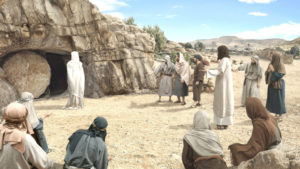The Lord is my shepherd, I shall not want.
He leads me to lie down in green pastures.
He leads me beside quiet waters. He restores my soul.
He guides me in the paths of righteousness For His name’s sale.
Even though I walk through the valley of the shadow of death,
I fear no evil, for You are with me; Your rod and Your staff, they comfort me.
You prepare a table before me in the presence of my enemies;
You have anointed my head with oil; My cup overflows.
Surely goodness and mercy will follow me all the days of my life,
And I will dwell in the house of the Lord forever.
– David (1040-970 BCE), Third King of the United Kingdom of Israel, Biblical Psalm 23
 Each of us has one master spirit guide through life. It surprises me that so few people are eager to make the most of what is such an amazing personal resource! To go through your whole life never coming to closely know your spirit guide is like ignoring the fact that you have two hands and not one, simply because your non-primary hand is clumsier and your spirit guide is invisible. I am going to refer to your spirit guide as “him,” but you might well have a female guide. In fact, just anecdotally, our guides are often of the opposite gender. Your primary spirit guide is likely to be someone who has lately achieved the upper fifth level of spiritual development, and has therefore reached the point where he no longer needs to incarnate, but he can continue to grow spiritually by guiding someone on earth. Please read our beautiful frame-verse above. Much of what God does for you is lovingly done by your spirit guide, who is God’s hard-working minion under God’s close guidance. Your spirit guide is God’s hand in your life.
Each of us has one master spirit guide through life. It surprises me that so few people are eager to make the most of what is such an amazing personal resource! To go through your whole life never coming to closely know your spirit guide is like ignoring the fact that you have two hands and not one, simply because your non-primary hand is clumsier and your spirit guide is invisible. I am going to refer to your spirit guide as “him,” but you might well have a female guide. In fact, just anecdotally, our guides are often of the opposite gender. Your primary spirit guide is likely to be someone who has lately achieved the upper fifth level of spiritual development, and has therefore reached the point where he no longer needs to incarnate, but he can continue to grow spiritually by guiding someone on earth. Please read our beautiful frame-verse above. Much of what God does for you is lovingly done by your spirit guide, who is God’s hard-working minion under God’s close guidance. Your spirit guide is God’s hand in your life.
My dear beloved Thomas is as much a part of your life as I am. All the praise that you ever have given to me in fact belongs to him! Sometimes I can see Thomas at night, and the picture that heads this post is close to what my Thomas actually looks like. And so will all of us choose to look young, when we are again back in our eternal home. That semi-impatient look on his face is right, too, but he actually is a very nice guy. He simply is unwilling to suffer fools.
You wouldn’t have these articles each week if it were not for Thomas. I will say to him in my mind, “We need an article again,” and he will right away give me a topic and let me struggle with it for a couple of days; and then eventually he gives up and he helps me write it. Thomas always looks solemn. If I ever can get a smile from him, then that feels like a triumph! All of us meet with our guides at night while our bodies sleep. My formal meetings with Thomas mostly take place in a handsome cherry-paneled, windowless conference room in the astral plane, and usually Thomas won’t allow me to remember those meetings. Of late, we have been meeting with Jesus fairly often to talk about His planned website. And also, I suppose, to help me get over my being so in awe of the Lord.
This post is emphatically not Thomas’s idea. But I lost Monday and Tuesday of this past week because friends and clients kept calling me with birthday wishes, and also because of a small client crisis. Then it turned out that I was going to lose Wednesday and Thursday mornings to a luncheon and to a radio interview, so our usual leisurely blog-writing dance – which, frankly, I have come to enjoy – simply was not going to happen this week. We needed a topic that I could write about without much help from Thomas, and the only such topic that I could think of was… Thomas. It seemed to be past time, anyway. The only post that I could find that I had written primarily about him was written back when I was still crushing on his Thomas Jefferson lifetime, and he was irritated by my Jefferson obsession. He kept muttering, “Kid, get over it – you don’t know the half of it.”
And we know now that he was right about that! I will try not to make this all about Jesus, but they have become a close pair in my mind. The Thomas who was aligned with Jefferson, and the Jesus who was aligned with Christianity, have been replaced in my mind since the 6th of April by what irreverently, but with enough love to fill to bursting my whole heart, I have come to refer to as “The Boys.” I have actually met with my Thomas and Thomas Jefferson at the same time so I have seen that they are two different people. And the Jesus of today with olive skin, hazel eyes and dark curly hair, and often with a lighthearted smile, looks nothing at all like church-Jesus. He doesn’t talk or act like church-Jesus, either.
Now you are likely wondering whether I might have gone off the reservation. Has Thomas approved what I have written this week? What he has said, and I quote, is, “You control the hands.” Well, true. But if there were anything in this post that he disapproved of, he has ways by which he could emphatically say that.
 I think that most of our spirit guides would prefer to work internally. But still, it is not hard to learn to recognize your guide’s separate voice. And once you can do that, you have a new best friend for life. My Thomas was entirely internal until he had to come out to me through a medium in early 2015 in order to persuade me to channel Liberating Jesus. He had to tell me then who he had been in his previous earth-lifetime as a strong-arm tactic, and for another couple of years he was willing to communicate with me through a medium, but I never got over that Jefferson connection. I am such a big Thomas Jefferson fan! I mean, the Declaration of Independence, for heaven’s sake? And in order to begin to prepare me to channel Liberating Jesus, Thomas had in 1990 channeled My Thomas, which is the finest piece of writing that I ever am going to do in my life. I really was having trouble getting past that Jefferson connection. So then one day Thomas abruptly stopped communicating through mediums altogether, and he insisted that I learn to communicate with him without any medium between us at all.
I think that most of our spirit guides would prefer to work internally. But still, it is not hard to learn to recognize your guide’s separate voice. And once you can do that, you have a new best friend for life. My Thomas was entirely internal until he had to come out to me through a medium in early 2015 in order to persuade me to channel Liberating Jesus. He had to tell me then who he had been in his previous earth-lifetime as a strong-arm tactic, and for another couple of years he was willing to communicate with me through a medium, but I never got over that Jefferson connection. I am such a big Thomas Jefferson fan! I mean, the Declaration of Independence, for heaven’s sake? And in order to begin to prepare me to channel Liberating Jesus, Thomas had in 1990 channeled My Thomas, which is the finest piece of writing that I ever am going to do in my life. I really was having trouble getting past that Jefferson connection. So then one day Thomas abruptly stopped communicating through mediums altogether, and he insisted that I learn to communicate with him without any medium between us at all.
Thomas would have much preferred to go back to meeting with me only at night, and with me never remembering those meetings except subliminally. But the cat was thoroughly out of the bag. He knew I wasn’t going to settle for anything less than direct communication. In fact, I bluntly told him so. Many people have been asking me how someone who isn’t a medium can develop the ability to recognize the voice of their own master guide, and it really is simple. In no special order, just:
- Ask your guide for his name. Often he will simply suggest that you give him a name. Whatever name your guide gives you won’t be his real name, anyway.
- Ask your guide to step outside of your physical body, so you can separate his voice from your thoughts. Generally your guide will move to just behind your dominant shoulder. I am left-handed, so Thomas is behind my left shoulder. Even if I am sitting against a wall or lying down.
- Develop a habit of talking to your guide as a separate person. And always be very respectful. There is such a shortage of bodies now that in some cases – mine is an example – some remarkable beings are accepting assignments as spirit guides, so once they have completed their guidance duties they can have an avatar on earth at this crucial time that they can use for their own purposes.
Not only are you two people in one body, but in our case it is clear that Thomas is much the brighter, and also the stronger and the more powerful individual. The fact that together we present to the world as an old woman is a fake-out. Call it a bit of camouflage. This body contains an old woman and a very bright young man. Never judge a book by its cover.
I should add, too, that talking with your spirit guide isn’t like chatting with someone by phone. Thomas and I generally communicate in boluses of thought, with whole ideas sent rapidly to one another, which is the way that people communicate in the astral. And it is vastly more efficient than using words! Occasionally, though, Thomas will use words, and when he does, it is generally just one or a few distinct words. His voice sounds much older than he looks. For example, although I stopped watching television twenty-odd years ago, if I occasionally watch a longish computer video that he considers to be beneath our intelligence, I might unexpectedly hear a deep and venerable male voice say, “Stupid!”
 And Jesus, when I have heard Him speak, doesn’t sound really older than He looks, but He has a mild, distinctive accent. He is still wrapping up His seventeen-hundred-year period of welcoming and healing the victims of Roman Christianity. So now He is starting to think about perhaps having a website that He can use to resurrect His Way, and He is thinking about perhaps even basing it on Liberating Jesus. Or so He said when He invited me to visit Him on April 6th. But, where did He get those ideas? It is first now that I am wondering. Since Jesus has lived without time and disconnected from the earth for the past two thousand years, I have been wondering where any of that might have come from. When I first asked Thomas, he shrugged. (And yes, I can tell when he shrugs.) But I persisted.
And Jesus, when I have heard Him speak, doesn’t sound really older than He looks, but He has a mild, distinctive accent. He is still wrapping up His seventeen-hundred-year period of welcoming and healing the victims of Roman Christianity. So now He is starting to think about perhaps having a website that He can use to resurrect His Way, and He is thinking about perhaps even basing it on Liberating Jesus. Or so He said when He invited me to visit Him on April 6th. But, where did He get those ideas? It is first now that I am wondering. Since Jesus has lived without time and disconnected from the earth for the past two thousand years, I have been wondering where any of that might have come from. When I first asked Thomas, he shrugged. (And yes, I can tell when he shrugs.) But I persisted.
Together, Thomas and I have thought through the fact that Jesus knows about Liberating Jesus, of course, having channeled the book through me. And the idea for a new, simpler book first occurred to Him in the early nineteen-eighties of earth-time, when He seems to have first learned that A Course in Miracles is too challenging for most people to get their minds around. And here it becomes somewhat fascinating! Thomas tells me that they used My Thomas, which is a biography of Thomas Jefferson’s ten-year marriage that Thomas channeled through me in 1990 so they could make sure that I would be able to channel Jesus’s simplified version of The Course if He should later decide to channel a simplified version of The Course. And then for the next fifteen years, Thomas led me to do exhaustive additional research so Jesus would have in my mind a whole attic full of information to rummage through and use when He took over my mind and hands in 2015 to write Liberating Jesus. A plan which I then attempted to foil, when I tried to refuse to accept that honor.
 So, is that where Jesus learned about websites? He found the concept in my mind? Thomas says that Jesus has just been dropping in with him on earth more lately, since he has a little more free time now, so He has been coming to know me a bit as well. He made the afterlife evidence that He found in my mind an Appendix to Liberating Jesus. And now here we are, doing a whole website on that subject. I don’t think that I had even opened Liberating Jesus in the past five years, but we have lately changed publishers, and I was surprised when I reviewed its new galleys to see how much Liberating Jesus follows the format of my other books. It had been Craig’s and my original thought to make discussing The Way of Jesus a part of seekreality.com, but then it seemed to us that it would be better if we took the time to give it a separate, linked website, since so many lapsed Christians of late are seeking a new spiritual home that is based in the teachings of Jesus. Thomas tells me that Jesus has been thinking about just taking over our idea Himself, and making our linked website His own.
So, is that where Jesus learned about websites? He found the concept in my mind? Thomas says that Jesus has just been dropping in with him on earth more lately, since he has a little more free time now, so He has been coming to know me a bit as well. He made the afterlife evidence that He found in my mind an Appendix to Liberating Jesus. And now here we are, doing a whole website on that subject. I don’t think that I had even opened Liberating Jesus in the past five years, but we have lately changed publishers, and I was surprised when I reviewed its new galleys to see how much Liberating Jesus follows the format of my other books. It had been Craig’s and my original thought to make discussing The Way of Jesus a part of seekreality.com, but then it seemed to us that it would be better if we took the time to give it a separate, linked website, since so many lapsed Christians of late are seeking a new spiritual home that is based in the teachings of Jesus. Thomas tells me that Jesus has been thinking about just taking over our idea Himself, and making our linked website His own.
There are downsides to being the most popular Man on earth. Every conceivable name for a website that includes the name of Jesus has already been taken. But Craig has managed to buy teachingsbyJesus.com, and we plan to go with that. We still don’t know what Jesus wants to do with His new website, and nor does Thomas really know, and Jesus has never even used a computer, so all of us will be feeling our way. All that I can think to do is to turn the teachings of Jesus into short educational videos, so I guess we will be starting with that.
But I do have one problem. Writing this post has made me think about the fact that very soon now my relationship with my beloved Thomas is going to end. My beautiful master spirit guide serves the Master, and only the Master. He has delayed his own ascension to the level of the Godhead for thousands of earth-years in order to serve Jesus. He became my spirit guide as another way to serve Jesus, just so once we had completed my spiritual earth-lessons I could be Jesus’s avatar on earth. And now once my Thomas has seen me through my life-review after I die, his service to me will honorably end. But I have fallen completely in love with my wonderful, beautiful Thomas! I cannot bear to lose him forever among a hundred billion other people in the endless astral. Take a good look at that impatient face that clearly does not suffer fools. What do you think he would say to my telling him how much I have completely fallen in love with him?
To my surprise, what he actually said was, “I know. That is what is supposed to happen.” He told me that once I am back in my greater mind, I will be male again, he and I will be close friends again, I will remember many very important things, and we will have a lot to laugh about. But meanwhile, he said I should finish this blog post.
























































